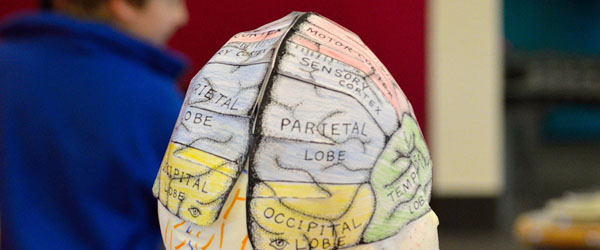MSc Clinical Neuropsychology

Overview
The MSc is accredited by the British Psychological Society (BPS) Division of Neuropsychology and delivers teaching and support that provides both the knowledge and practice competencies required for entry on to the Specialist Register of Clinical Neuropsychologists (SRCN).
Knowledge competencies are delivered through teaching and around 80% of this taught content is delivered by clinicians practicing in the NHS. You will learn about a range of neuropsychological disorders and pathologies as well as focusing on principles of assessment, formulation and rehabilitation.
Alongside taught content relating to the adult knowledge competencies, this MSc also provides support as you develop your practical experience and competencies in clinical neuropsychology. In order to accrue relevant clinical experience, it is your responsibility to secure paid employment within a neuropsychology service during your enrolment on the MSc. It is also your responsibility to secure supervision for your work when enrolled on the course. However, we provide additional oversight and support towards developing your case portfolio and ensuring your clinical experience demonstrates the required competencies for entry to the SRCN. This support includes discussion of case formats and patient cases, and help in managing supervisions. This support is provided by clinicians with experience of conducting portfolio vivas for entry to the SRCN.
Entry requirements & fees
You must have a doctorate in clinical psychology or counselling psychology and be registered as a psychologist with the Health and Care Professions Council. Applicants with other practitioner psychologist qualifications should contact the School to discuss (postgrad-psychology@bristol.ac.uk).
For full detail on entry requirements and fees, please see our prospectus webpage.
Online learning & lectures
Bristol has experience delivering online courses since 2010. All lectures are broadcast live on the internet and can be viewed as recordings whenever required. The course is organised through our online learning environment where you will find easy access to course information, timetables, assignments, discussion boards and other sources of help and support.
Candidates are encouraged (but not required) to attend Bristol for four one-week teaching weeks for the knowledge component that are spread across the duration of the course (two weeks a year if taken part-time). Otherwise, weekly lectures are delivered online and candidates can take the course from home (or work). Lectures during teaching weeks are recorded and made available to replay. Assessments are conducted online and occur twice a year in the January assessment period and the Summer assessment period. See the key dates of the University website for details.
Tutorials, reviews, practice vivas, formulation workshops and vivas related to the practice dimension are delivered online and the course can be taken remotely.
Part-time modes of study
We recognise that those studying on our courses will be balancing busy employment schedules, family/caring commitments and the demands of study. As such, this MSc can be taken full-time as a one-year course or part-time over 2 or 3 years. Selecting the right length of study will depend on the intensity of your post-qualification neuropsychology practice, but we can facilitate transfer to longer durations of study during your enrolment with us if there are changes in circumstances or need. Equally, candidates may apply for further extensions to their course duration up to a total of 5 years active study time with us. This time would exclude any suspensions that may be required (e.g. for health, changes in employment or parental responsibilities...).
There are two entry points for the programme each year: September & January.
Course structure, units and assessment
This MSc consists of six taught units (total of 120 credits) plus a 60-credit Clinical Practice Dissertation. Please visit our programme catalogue for full details of the unit content.
Scholarships
There are a number of scholarships that are available for postgraduate study at Bristol, and these include UK, EU and international students. More information about scholarships can be found on the University of Bristol's funding web page, and there is also information specific to each country. The Student Funding Office has further information about funding postgraduate study.
Workload
Full-time
The academic year is comprised of two 12-week teaching blocks and the summer period.
For the knowledge component involving taught content: in each teaching block, there is one week of intensive teaching (~20 hours in one week), otherwise there are typically three 2-hour lectures per week. Online assessments occur twice a year in the January assessment period and the Summer assessment period. Check the University dates page for details.
For the practice component: we would expect progress with accruing relevant clinical practice and supervision to proceed alongside the taught content and we would recommend that you submit a case report for formative feedback by the mid-point (6 months).
Part-time
Each academic year is comprised of two 12-week teaching blocks and the summer period.
For the knowledge component involving taught content: in each teaching block, there is one week of intensive teaching (~20 hours in one week), otherwise there is typically one 2-hour lecture per week. Online assessments occur twice a year in the January assessment period and the Summer assessment period. Check the University dates page for details.
Note that for part-time over 3 years, we would expect the taught content to be completed within 2 years (excepting changes in circumstances), but provide additional time for the practice component.
For the practice component: we would expect progress with accruing relevant clinical practice and supervision to proceed alongside the taught content and we would recommend that you submit a case report for formative feedback by the mid-point (12 or 18 months if 2 or 3 years part-time, respectively).
Backdating prior practice experience
To demonstrate practical competency, you need to provide evidence of two years of supervised clinical practice relevant to clinical neuropsychology.
Up to 12 months of clinical experience can be recognised post-hoc via an application for backdating and validation once enrolled.
